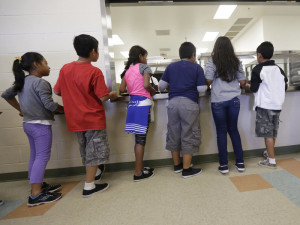What To Do After Your Asylum Has Been Approved
”El Show Sin Fronteras”
Spanish Video Above Translated In English Below
Welcome to our Show Sin Fronteras, our hosts Karla and Fidel will be chatting with our beloved legal guardians, this time we have the compy of our Austin immigration attorneys, Jackie and Kate.
A few days ago, we enlisted the most important aspects of a topic many of you found very interesting, we are talking about Juvenile Visas and Asylum when you are under age.
Those young people who leave their country of origin to fight and follow their dreams hoping to get a better life, to reunite with their loved ones or family in the United States.
What Happens If My Juvenile Visa Has Been Approved?
When we already have this type of asylum approved, you may be wondering: What happens next? What is the benefit I receive when I submit my asylum application and I am told that it has been accepted? What is the first thing that is accepted with the Juvenile Visa?
Our lawyer Jackie tells us: ”There is a limit of Visas that the Government gives us every year, so there is a waiting line but after the Visa is available we start the application for permanent residency”.
First, our application has to come in, and then we’ll have the residency.
Residence Benefits
When we have the residency, What benefits come with this residency?
Jackie comments: ”After obtaining your permanent residency, the person will not need to renew the work permit every year”
Residency is the only document you will need to prove your eligibility to work along with your social security.
A person with a green card can travel outside the United States with the passport of his or her home country, and that is a very important benefit.
For our clients, this is especially good, because people who have not been able to see their relatives in many years and have always talked to a lawyer before leaving the country to evaluate if there is any risk or there is a punishment, any problem, but in general, of course, a person with residency can travel, and after 5 years with permanent residency, the applicant can apply for US citizenship.

All permanent residents should first consult with an immigration attorney before traveling outside of the United States just to see if there is a risk to travel so that we can prepare legally.
What Happens If I Don’t Get Asylum?
Many of our clients call our office and tell us that they may be considered fraudulent to the United States when they apply for asylum, and they are very afraid to return to their home country. Is there a problem if they come back? Does age affect whether you return to your home country and to the U.S. by the time you become a U.S. citizen?
Jackie says: ”For people with an approved Youth Visa when they receive their residency there is no restriction because approved people can visit their country of origin”.
Already a refugee or asylum seeker who is telling the U.S. Government that they cannot return to their home country because of persecution, for example, is different than the Youth Visa.
It’s not a good idea to go back to your home country to live permanently but yes, of course, you can travel and visit or vacation anywhere.
Can I Return To My Country If I Have Asylum?
This question goes to our lawyer Kate: What if the person did not consult with an attorney? The person went out and on his return, the migration officer says your permanent residency is no longer active since you visited your home country. What would be the best recommendation there could be in that situation for that person?
Our attorney Kate tells us: ”To clarify, a permanent resident who has no arrests and no fraud of any kind, no Child Support, no warrants or anything like that and wants to travel for less than six months, should have no problems returning to the country even with Border Patrol, and also those who received permanent residency through asylum as well, after they have permanent residency can go and visit their home countries, but they should consult with an attorney first”.
Let’s say that if someone with permanent residency has a criminal record, has a punishment for domestic violence, for drunk driving, for anything, what can happen is that when they return, they can be interrogated and sometimes put in deportation proceedings, have their residency taken away or have abandoned their residency.
It can be a very stressful process at the time when you are at the airport with Border Patrol, but you also have to appear at a hearing to defend your status.
The most important thing is that if someone has concerns about their history or anything in their case, it would be best to consult before they leave or before they return, at least to have a plan for what the risks are of having traveled with their residence and with their specific case.’
Special Aspects Of A Permanent Residency Through Asylum
Many people are confused that this residency they get after applying for asylum is not the same as other residences. Is it true or is it a lie? Is there a difference between them? For example, one of our clients called us to ask if she could get vaccinated because she was an asylee.
Kate shares with us: ”There are a lot of questions to answer, but with this question, first of all, the vaccination requirement applies to all people who are applying for permanent residency because they have had asylum, because of a family case or an employee’s case, etc. All those who are arranging through the Consulate or adjusting their immigration status in the United States.
Those who are applying for permanent residency for the first time must take the medical exam, and a requirement of that exam is to have a complete list of vaccinations, which now includes the Covid vaccine.
No matter how it is being arranged, but this goes also for people who want to visit the United States today.
People entering as tourists have to prove they have received the COVID-19 vaccine, people who are entering the country on a Visa, and someone who already has permanent residency and wants to travel should check what the policies are at this time on citizens or permanent residents.
Anyone is going to have different policies depending on the country they want to visit, for example, in Costa Rica, a Negative Test against Covid is required to visit that country, and to return depends on the timing and the policy in place during that trip.
For all the people who have plans to travel for Christmas or New Year, for example, they should know before leaving what are the requirements to leave and to enter again.
In answer to the other question, yes there are differences between the types of permanent residency, and the answer is a bit complicated, but in general, when someone already has permanent residency and has their Green Card, all rights are the same.
The consequences of being arrested or detained are also the same.
It doesn’t matter in the manner of how the person arranged, but for people who are arranging to become permanent residents, there are different requirements and penalties depending on the manner of arrangement.
We have a question from our audience for Jackie that reads as follows: How long does my refugee status already last here in the country?
Our attorney Jackie shares with us: ”That means you have 1 year before you qualify to apply for residency, so it depends on how long the adjustment of status for residency proceedings takes.
Now unfortunately it’s quite delayed in my opinion because there are people who received their asylum or refugee status about 4 years ago and applied for residency 1 year after the approval of the status and that application is still pending.”
In the time that this residency response is pending, do they have any work permits, any benefits, or anything? Do they have any work permits, benefits, or anything?
Jackie says: ”Yes, of course, people get their work permit and they can renew it continuously the next year, but this is a shame in my opinion, and the government should do something to move all the pending cases forward because they are residencies where nobody has a work permit and they don’t have a work permit. to worry about the expiration date of the work permit.
After they pay the immigration fees and charges, they will get their protection.
Deportations & Refugees
Another question we are being asked says: Can I be detained and deported as I have refugee status?
Jackie tells us: ”If a person who has refugee status is arrested for any reason, the Government can detain the person because anyone who doesn’t have citizenship can be arrested and detained at any time if there is a problem with the law, and anything they do that is considered a crime.
Differences Between Asylum & Refuge
Last week we were talking about asylum, that if asylum was lost or if asylum was unsuccessful, were people at risk of being deported in the end?
Our dearest lawyer Kate tells us: ”I am going to say something to the people who always accompany us, and that is that we are talking about many issues and it is important to give them the definition of each type of case because it can be a little complicated and confusing.
A refugee is a person who received status outside of the United States, perhaps lived in a camp in Pakistan, went through the interview and application process, received status, and entered the country as a refugee.
Refugees
Those people can be refugees for as long as they want because they can renew their refugee status every year for their entire lives, although after one year they can apply for permanent residency and thus obtain their Green Card.
After a few years, they can also apply for citizenship, but it is not necessary.
In short, they can stay with refugee status for life, they can become permanent residents and stay that way for life or they can go through the process of becoming a U.S. citizen, that’s a refugee.
Asylum
Instead, an asylum seeker is a person who came to the United States without status, came across the bridge asking for protection, or crossed and was caught, passed the credible fear interview, and then won their asylum case with immigration.
These people can also have that immigration status for life by renewing their work permit, but they can also apply to become permanent residents and also have the opportunity to obtain U.S. citizenship.
The 3rd type of case is a little bit involved in today’s topic, which is Juvenile Visas. Special Immigrant Juvenile Visa and that’s the program for children under the age of 18 in Texas who have been abandoned or abused by a parent, and that’s a different asylum case.
Many people use the terms Juvenile Asylum, Youth Visa, or Refugee as words that mean the same thing, but in fact, a Refugee is different from a person who applied for Asylum, which is also different from a Youth Visa.”
Asylum & Extraditions
Another question that our dear audience asks us is the following: What about someone who has applied for asylum and has been granted it, but the country from which he or she escaped requests that the United States bring the person back? What about that person who has asylum?
Kate tells us: ”I have not worked with this type of case, but I imagine that when the United States has given protection to a person seeking asylum or who is seeking asylum and is in process, our country is not going to return that person to their country, but in fact, it is a case that I have not had yet, and we would have to study their case in detail”.

Underage Children Aspiring For A Better Future In The United States
Permanent Bars & Its Conditions
One more question we get from our networks is this: If someone has punishment and left the United States but returned, does the punishment count when they left, or will the person have another punishment?
Kate says: ”I think he’s talking about permanent punishment that is not actually permanent, but that punishment is going to apply to people who have been permanent, but that punishment is going to apply to people who have been deported or have been in the U.S. for more than a year without permission in the United States and they go and try to come back without permission”.
The most common situation is when someone, for example, entered in 1998, stayed in the country without being caught, stayed 2 years, left to visit relatives, and then returned without permission.
That person carries a permanent punishment, what does that mean? that if you want to settle for a family member, you have to leave the United States for 10 years and then ask for a pardon to come back, and I think that’s the punishment you’re asking about, but there are many types of punishments and each time it’s different, Each type of case has other policies about what pardons are available to fight.
The punishments for example in cases of the U Visa, the T Visa which is for victims of crime or victims of human trafficking, yes it is possible to forgive almost all punishments, including permanent punishment, so only when someone knows that they have a type of punishment is not the full story of their case, we have to also know their options to see if there is a way or a strategy to defend or forgive that punishment.
For this reason, it is always necessary to consult directly with us about your specific case because we want to review everything we can to help you.
My Asylum Process Is Delayed. What Do I Do?
A comment from our dear audience is the following: I’m in the asylum process but I haven’t been approved yet, I haven’t been called in 4 years. What can I do?
Our attorney Kate says: ”For people who are in the asylum process for many years, this can happen as it is very common in both affirmative and defensive cases.
Affirmative cases are for people who entered the country without being caught or who entered with a visa and then applied for asylum with the asylum office.
Defensive cases are for people who are in removal proceedings and are in front of an immigration judge, but both types of proceedings take a long time.
We have cases in our office of people who have been in the asylum process in immigration court for almost 10 years since 2012, and depending on their situation it is possible to request advancement of their case.
If your case is affirmative for example, and perhaps you have relatives in your own country who are at risk there and you have to finish your case to be able to bring them with you, already in that kind of situation it would be possible to ask for an Expedite request that would move your case along faster, but it depends on the circumstances and that’s something we could review in a consultation.”
If you have additional questions about Youth Asylum, Refugee, Juvenile Visas, or your specific case, you can contact us at (855) 502-0555. After a short 10 minute evaluation of your case via telephone we will let you know what options you have. You can also follow us on our social networks so you don’t miss our weekly broadcasts via Facebook, YouTube & Twitch.
Contact A U.S. Immigration Attorney Today!
Categories
How To Find Us
What Our Clients Say
“This Lawfirm is great, very professional and helpful. I love that they are always in communication and always available for when you have questions . 100% recommended by me and my family. Thank you Lincoln-Goldfinch Law – Abogados de Inmigración”







